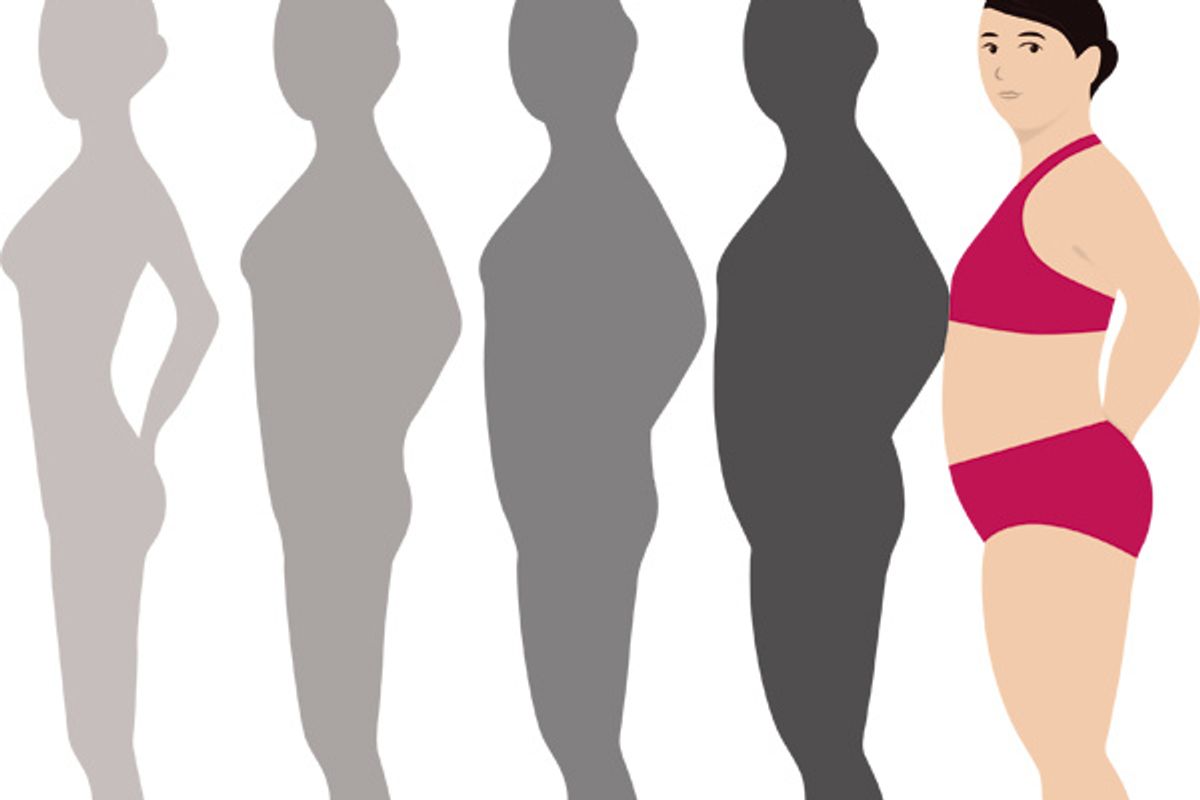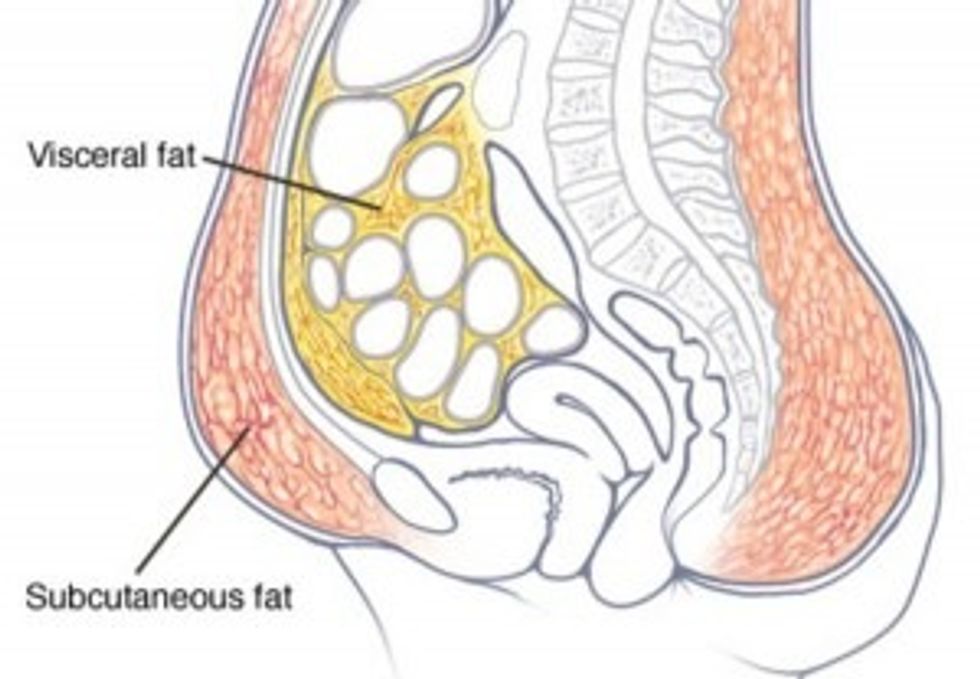This article has been archived. We will no longer be updating it. For our most up-to-date information, please visit our menopause hub here.
by Jennifer Franceschelli Hosterman, DO
We go through many transitions during life that make us susceptible to weight gain. Some are shared by both genders: arriving at adolescence, entering our elder years or undergoing a stressful life event. Others happen only to women: having a baby, then having a second or third baby, and going through menopause.
The National Health and Nutrition Examination Survey data found that:
- 51.7 percent of women ages 20-39 were classified as "overweight" or "affected by obesity"
- 68.1 percent of women ages 40-59 were classified as "overweight" or "affected by obesity"
The 40-59 age range includes the time that most women are perimenopausal. As we age, we start losing our muscle mass, and fat storage tends to increase. This change in body composition puts us at higher risk for metabolic disease, such as heart disease and diabetes.
So, you may be thinking, I'm destined for failure! But this isn't true. There are many things that go into weight gain during this phase—and many can be modified. Let's look at how menopause and other contributing factors can affect your weight and what we CAN do to minimize the potential health threats.
So, What Exactly Is Menopause?
Menopause is a normal stage in a woman's life. It occurs when you stop getting your periods altogether. It marks the end of the reproductive years. This happens because the ovaries stop making the hormones estrogen and progesterone. In most women, it happens gradually in three stages, but it happens more suddenly in women who undergo surgical removal of their ovaries.
Menopausal Transition or Perimenopause
The years leading up to your last period is called the menopausal transition or perimenopause. During this time, periods can stop and then start again. There is no way of telling how long this stage will last. It can be anywhere from two to eight years, with the average being four years. It usually begins when women are in their late 40s. It is often accompanied by symptoms such as:
- Hot flashes
- Change in sexual drive
- Trouble sleeping
- Urge to urinate more frequently
- Night sweats
- Mood changes
- Weight gain
Menopause
This occurs when you go 12 months in a row without a period. By this time, your ovaries have stopped releasing eggs and stopped producing most of their estrogen. Many of the symptoms that started in the transitional period may still be present.
Postmenopause
Postmenopause comes after menopause occurs. You no longer get the big surges of hormones like when you had your period. As a result, many of the perimenopausal and menopausal symptoms improve.
Weight Gain and Menopause
According to the Healthy Women Study, the average weight gain in perimenopausal women is about five pounds; however, 20 percent of the population they studied gained 10 pounds or more.
Not only is the weight increase from a drop in estrogen, it's also due to a decrease in energy expenditure. Some women may notice an overall weight gain while others may not see a difference on the scale but may notice that their pants aren't buttoning as easily. Both are surprising to many women because they may not notice a difference in their dietary intake or activity.
Estrogen plays a vital role in fat storage and distribution. Before perimenopause, estrogen deposits fat in your thighs, hips and buttocks. During and after menopause, the drop in estrogen leads to an overall increase in total body fat, but now, more so in your midsection.
 Studies have consistently shown that this waistline increase is different from when you were younger. The visceral abdominal fat increases as you enter menopause. Visceral fat is inside your abdomen and surrounds your organs. This is more dangerous than an increase in subcutaneous fat, which is found in places like your thighs, buttocks and outer abdomen.
Studies have consistently shown that this waistline increase is different from when you were younger. The visceral abdominal fat increases as you enter menopause. Visceral fat is inside your abdomen and surrounds your organs. This is more dangerous than an increase in subcutaneous fat, which is found in places like your thighs, buttocks and outer abdomen.
Visceral fat is thought to be more metabolically active, which has a negative effect on the body. An increase in visceral fat is linked to an increase in insulin resistance, diabetes, heart disease and inflammatory diseases.
Make Weight Gain a Modifiable Risk Factor
Although the risk of weight gain as a middle-aged woman is higher, this does NOT mean that it is required. It DOES mean that we may have to work a little harder to prevent it from happening. Keep in mind that many of the health risks found in the menopausal transition are also affected by weight.
If we are able to keep a healthy weight, or at least minimize any weight gain, then we are likely to minimize these additional health risks. Now that you know the risks, here are some ways to stay healthy during this midlife transition and avoid the midlife crisis!
Relieve Stress Without Food
Many women (and men) admit to eating under stress. And, let's face it, middle age can bring some tough times. Children are often leaving home, and some are returning. Your parents may need more help and guidance. This can be disruptive to your everyday life.
Focus on using non-food stress relievers. Try walking, deep breathing or scheduling some "me" time with your favorite book to unwind. Seek support from friends and loved ones who may have gone through similar situations.
Get Moving and Eat Less
During menopause, our energy expenditure decreases even if our activity level and nutrient intake stays the same. This is secondary to the hormonal changes with menopause as well as the natural muscle loss that is occurring. We need about 200 calories less in our 50s than we did in our 30s and 40s. This means that we've got to move more and eat less to keep our healthy weight.
To help decrease portion sizes, try splitting your meals with a friend, ordering a smaller portion when available or putting half in a takeout box right away. Try fruit or yogurt for dessert.
The American Heart Association recommends 150 minutes of moderate exercise per week. This can be accomplished as 30 minutes 5 times per week. Can't do 30 minutes? Then try dividing your time into two or three segments of 10 to 15 minutes per day. Add ANY activity to your day. Park farther from the door, use the stairs instead of the elevator or take the dog for a walk instead of letting him run out in the yard.
Be sure to add at least two days of strength or resistance training to your workout. Bone loss begins in the perimenopausal stage. Strength and resistance training help maintain bone mass. This will help to prevent osteoporosis, which is bone loss that can lead to easy fractures.
Talk With Your Doctor
With all the changes that happen during the transition to menopause, it's understandable that you may be uncertain if the symptoms you are experiencing are normal. Instead of worrying, or worse yet, delaying treatment for something abnormal, talk with your health care professional.
While friends or family and some reputable Internet sites may be helpful, every person is different. A symptom may be normal for one person but not for you. Your health care provider has the most reliable information that is tailored to you. Your health care team can be a vital component of your support system and help make this transition as smooth as possible.
Jennifer Franceschelli Hosterman, DO, is a board-certified obesity medicine specialist and internal medicine physician with training in pediatrics and nutrition support at Geisinger Medical Center. She is also the medical director of Camp ENERGY, which is a healthy lifestyle camp for adolescents. She earned her bachelor's degree in cellular and molecular biology at West Chester University and completed medical school at Philadelphia College of Osteopathic Medicine. She is a strong proponent of the multidisciplinary and family approach in the prevention and treatment of obesity.
"The Truth about Menopause and Weight Gain" originally appeared in the summer 2014 issue of Your Weight Matters Magazine, a quarterly magazine published by the Obesity Action Coalition (OAC). For more information on the OAC, please visit www.ObesityAction.org.


 Studies have consistently shown that this
Studies have consistently shown that this 




